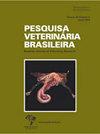Ammonia gas for bacterial control in poultry litter
IF 0.8
4区 农林科学
Q3 VETERINARY SCIENCES
引用次数: 0
Abstract
ABSTRACT: The current techniques used in the disinfection of reused poultry litter, such as lime addition, windrowing and plastic cover on the surface, do not guarantee the elimination of pathogenic microorganisms, causing damage to the environment and animal health. Gram negative bacteria, i.e., Salmonella and Escherichia coli, can be transmitted from one batch to another through reused litter, causing health damage to broilers and humans that consume food contaminated by these agents. Our study assessed the effectiveness of the methods plastic cover on the surface (PCS) and plastic cover on the surface with ammonia gas injection (PCSAI) in the control of Gram negative bacteria. The results obtained, both in laboratory conditions (Experiment 1) and in the field (Experiment 2), demonstrate that the method PCSAI with 0.22% ammonia gas had a significant reduction (P<0.05) of Gram negative bacteria in the period of 48 hours This new methodology for disinfecting poultry litter will allow its reuse in a practical and safe way, improving the preservation of the environment, of the health of broilers and consumers of poultry products.禽畜垃圾细菌控制用氨气
摘要:目前对重复使用的禽畜垃圾进行消毒的方法,如添加石灰、打窗、表面覆盖塑料等,并不能保证病原微生物的消除,对环境和动物健康造成损害。革兰氏阴性细菌,即沙门氏菌和大肠杆菌,可通过重复使用的垃圾从一批传播到另一批,对食用受这些病原体污染的食物的肉鸡和人类造成健康损害。本研究评价了表面塑料覆盖法(PCS)和表面塑料覆盖加氨气注射法(PCSAI)对革兰氏阴性菌的控制效果。在实验室条件下(实验1)和现场(实验2)得到的结果表明,0.22%氨气PCSAI方法在48小时内显著减少了革兰氏阴性菌(P<0.05)。这种新的家禽垃圾消毒方法将使其以实用和安全的方式重复使用,改善了环境的保存,改善了肉鸡和家禽产品消费者的健康。
本文章由计算机程序翻译,如有差异,请以英文原文为准。
求助全文
约1分钟内获得全文
求助全文
来源期刊

Pesquisa Veterinaria Brasileira
农林科学-兽医学
CiteScore
1.30
自引率
16.70%
发文量
41
审稿时长
9-18 weeks
期刊介绍:
Pesquisa Veterinária Brasileira - Brazilian Journal of Veterinary Research (http://www.pvb.com.br), edited by the Brazilian College of Animal Pathology in partnership with the Brazilian Agricultural Research Organization (Embrapa) and in collaboration with other veterinary scientific associations, publishes original papers on animal diseases and related subjects. Critical review articles should be written in support of original investigation. The editors assume that papers submitted are not being considered for publication in other journals and do not contain material which has already been published. Submitted papers are peer reviewed.
The abbreviated title of Pesquisa Veterinária Brasileira is Pesqui. Vet. Bras.
 求助内容:
求助内容: 应助结果提醒方式:
应助结果提醒方式:


